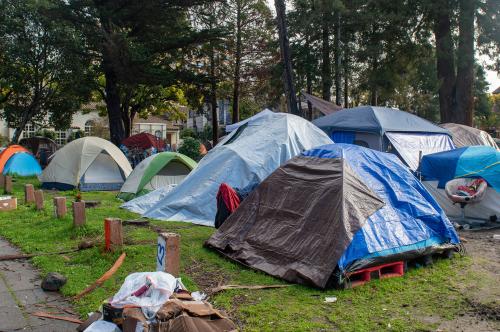On February 24, 2021, Brookings Metro Senior Fellow Andre M. Perry testified to the U.S. House Committee on Financial Services’ Subcommittee on Oversight and Investigations, during a hearing titled How Invidious Discrimination Works and Hurts: An Examination of Lending Discrimination and Its Long-term Economic Impacts on Borrowers of Color.
Perry testified that while overt discrimination in U.S. housing policy has been outlawed, systemic racism in the housing ecosystem still impacts Black families, both through the actions of individual appraisers as well as the broader industry’s devaluation of majority-Black communities. This is evidenced by such factors as the Black homeownership rate (which has barely budged past its 1966 rate of 46%) and the lower valuation of homes in Black neighborhoods regardless of their quality (23% lower than homes in white neighborhoods, or $48,000 less per home on average).
This persistent discrimination has deep ramifications for Black households’ ability to build wealth and achieve the American dream. While homes in metropolitan areas across the country skyrocket in value—increasing, on average, by $68,000 from 1980 to 2015 after adjusting for inflation—homeowners in disproportionately Black and Latino or Hispanic neighborhoods gain wealth at only half the speed as homeowners in disproportionately white neighborhoods.
Meanwhile, the housing market is structured to disproportionately exclude Black and brown households, as zoning codes and building practices incentivize the construction of very large homes at the expense of smaller, more affordable homes. “Because people of color are far more likely than white people to be first-time rather than repeat homebuyers,” Perry testified, “a mass of housing inventory weighted against attainable starter homes disproportionately favors households with higher concentrations of generational wealth to pay bigger down payments.”
At its core, Perry testified, the racism in our housing ecosystem is systemic. So the solutions must be as well, building off landmark legislation such as the 1968 Fair Housing Act to deliver a housing market that judges Black homes fairly and allows Black households to develop the wealth that they have been denied too long.
To read Perry’s full written testimony, click here.
The Brookings Institution is committed to quality, independence, and impact.
We are supported by a diverse array of funders. In line with our values and policies, each Brookings publication represents the sole views of its author(s).








Commentary
TestimonyHow racial disparities in home prices reveal widespread discrimination
February 24, 2021